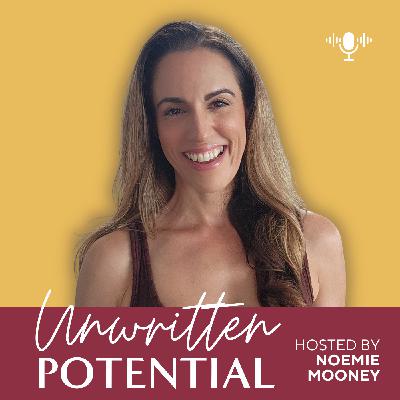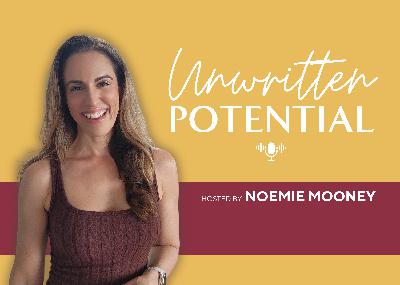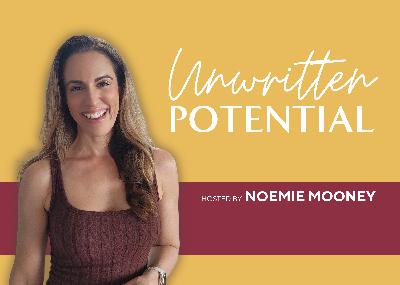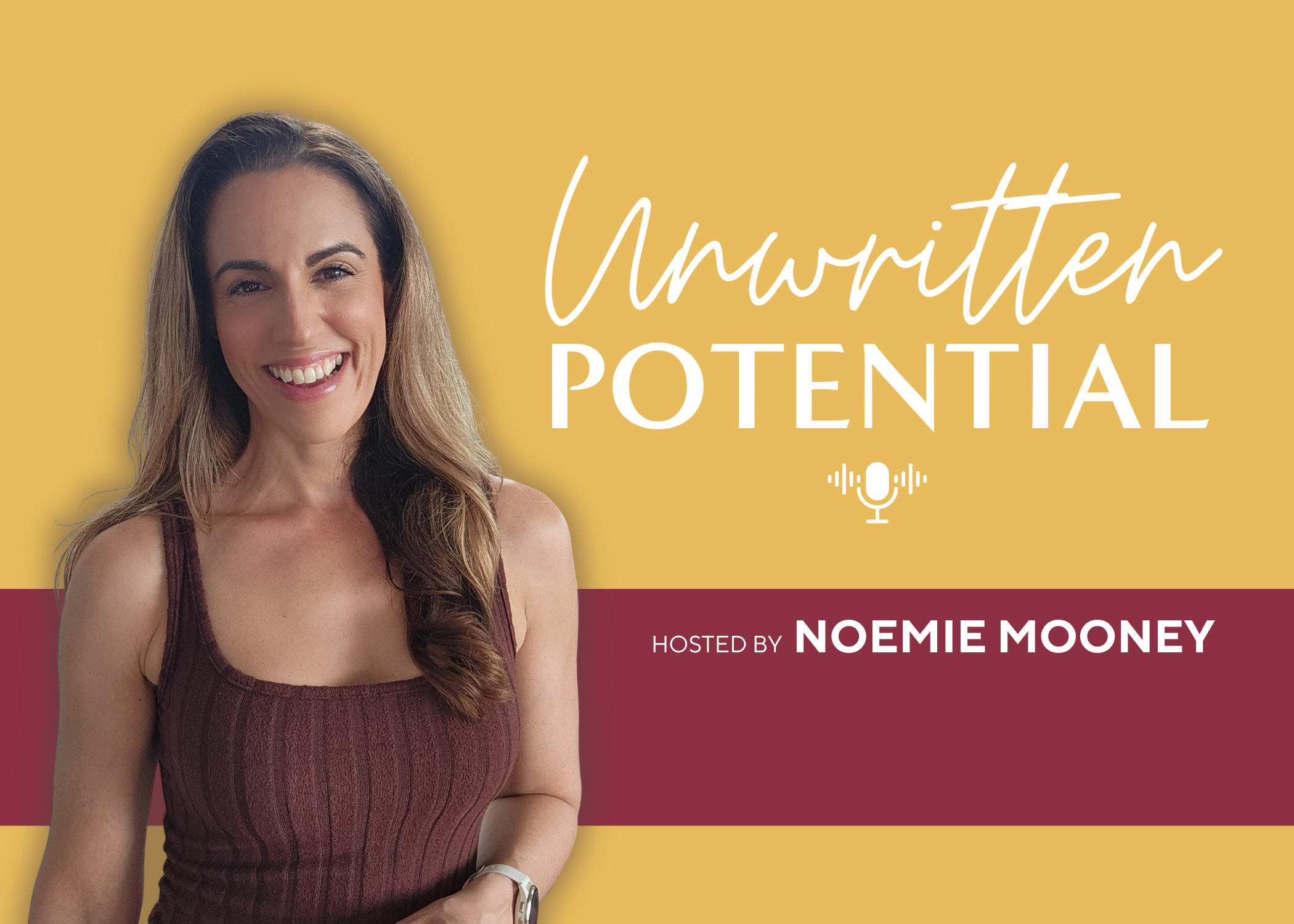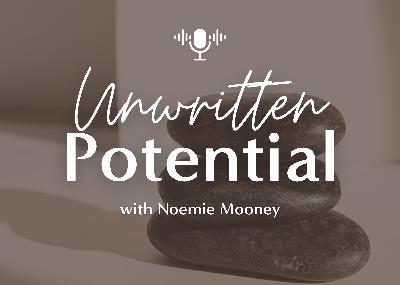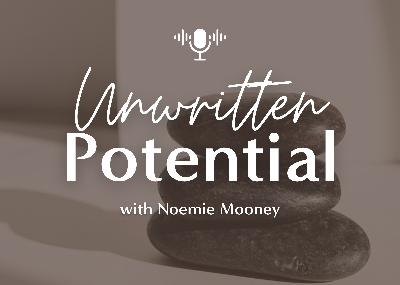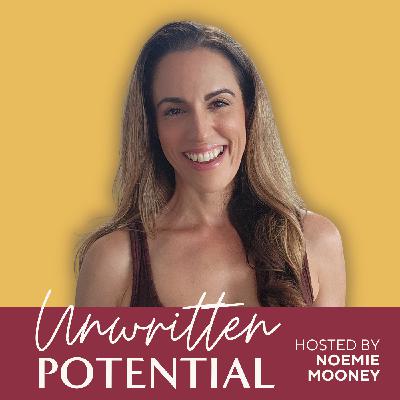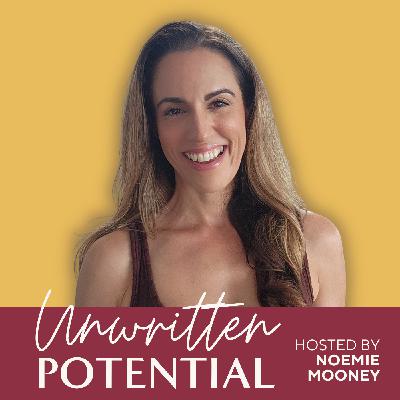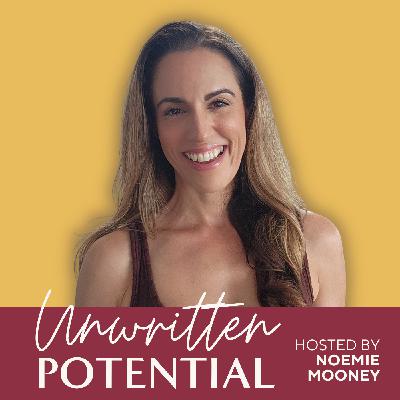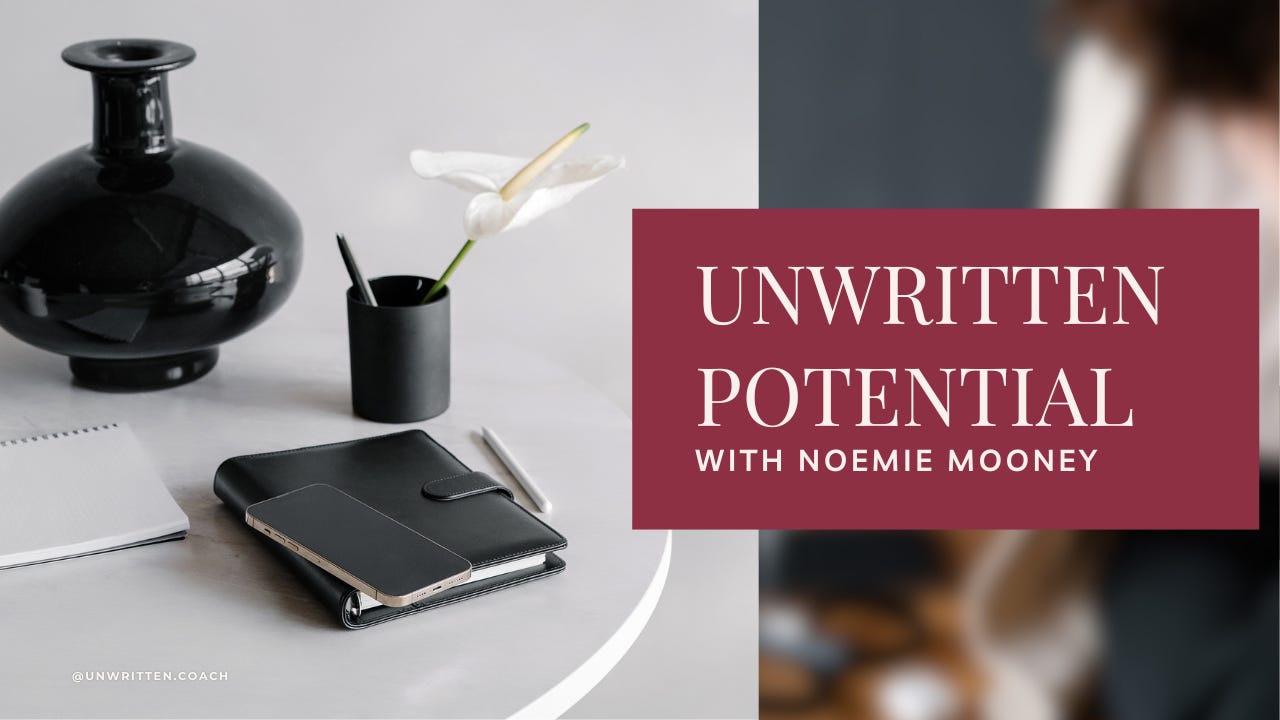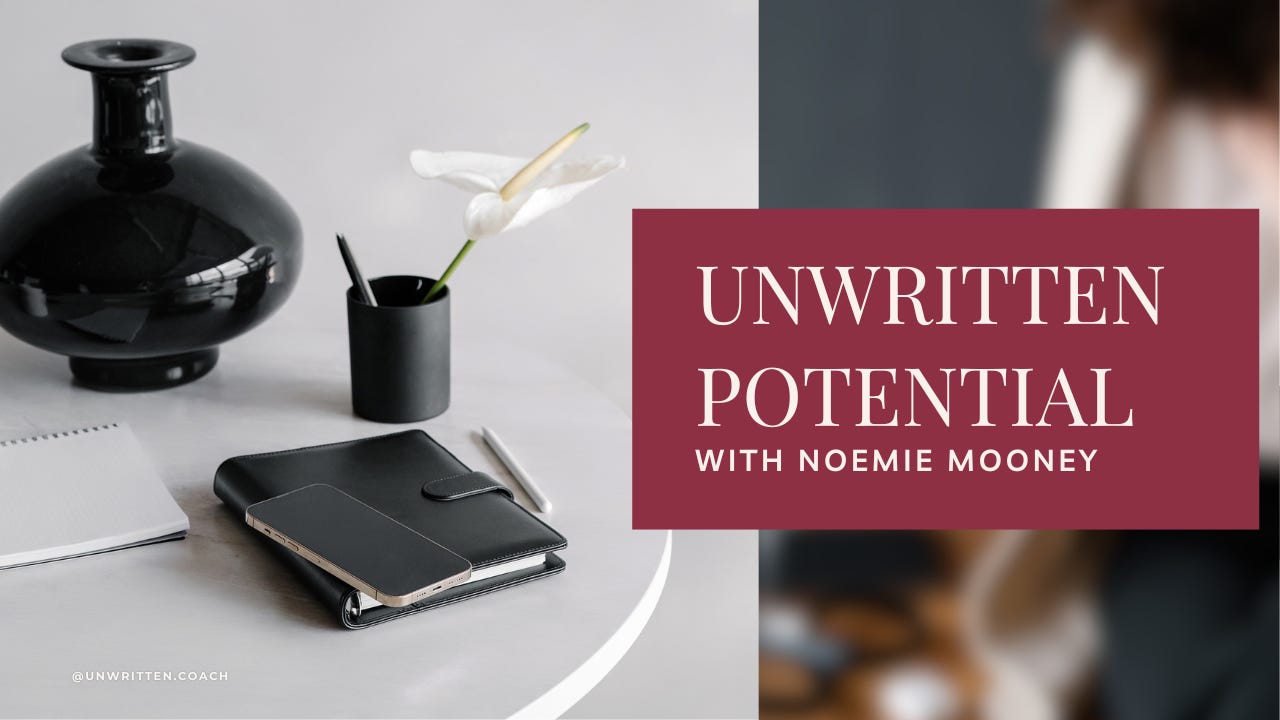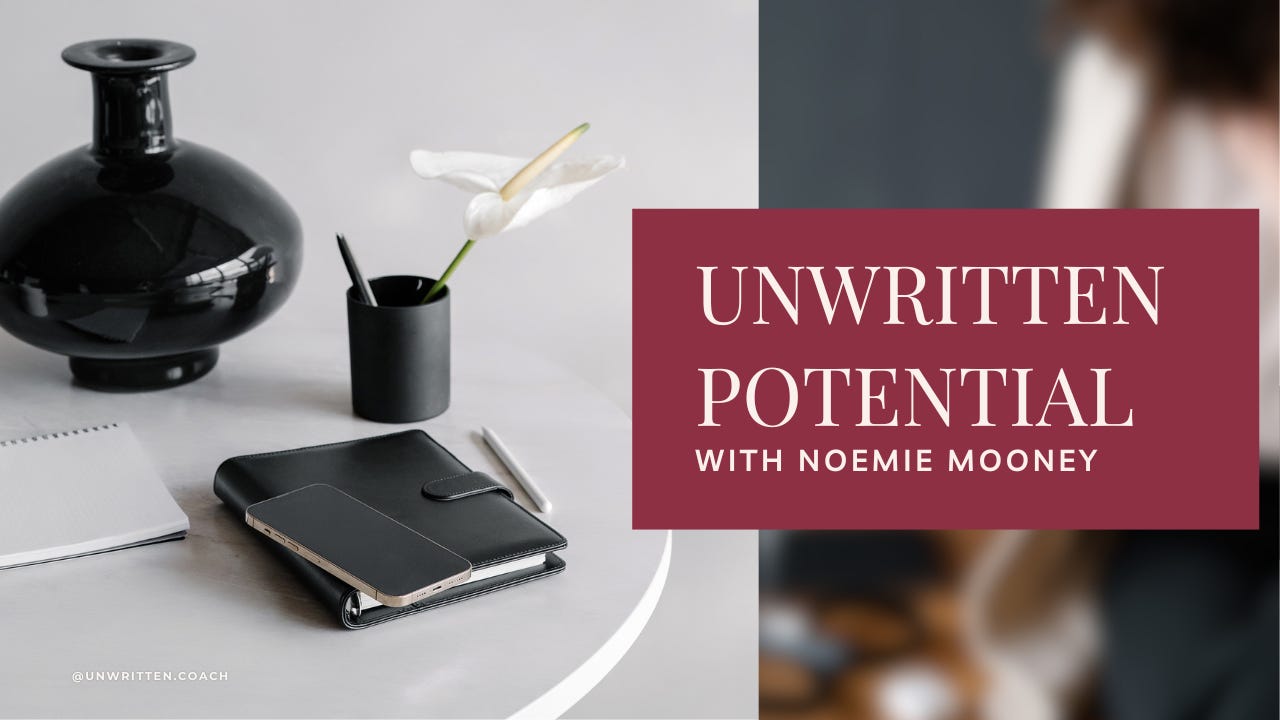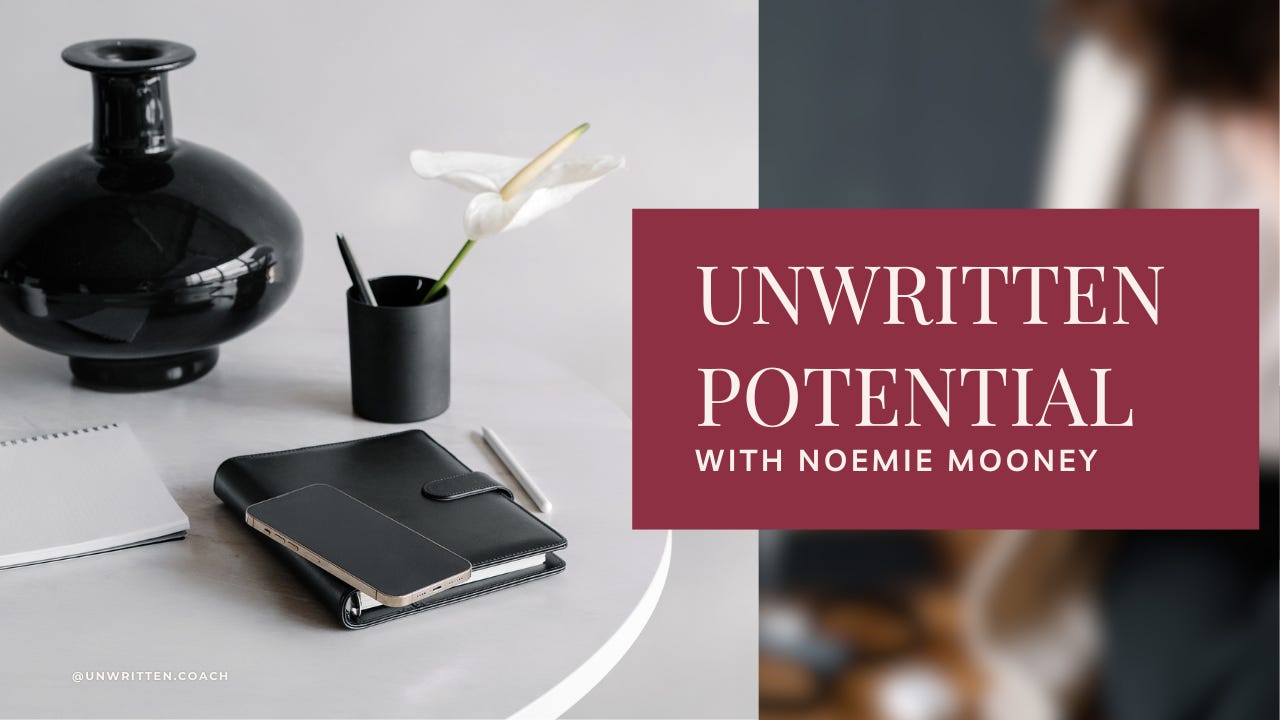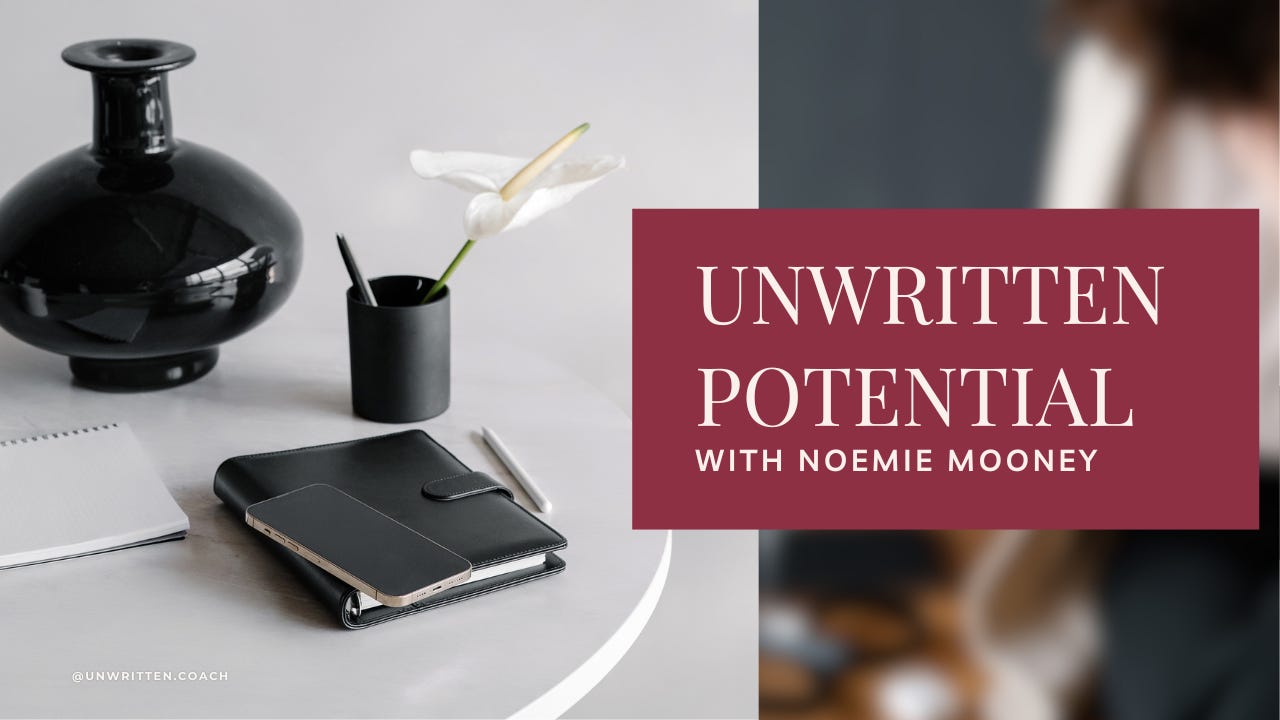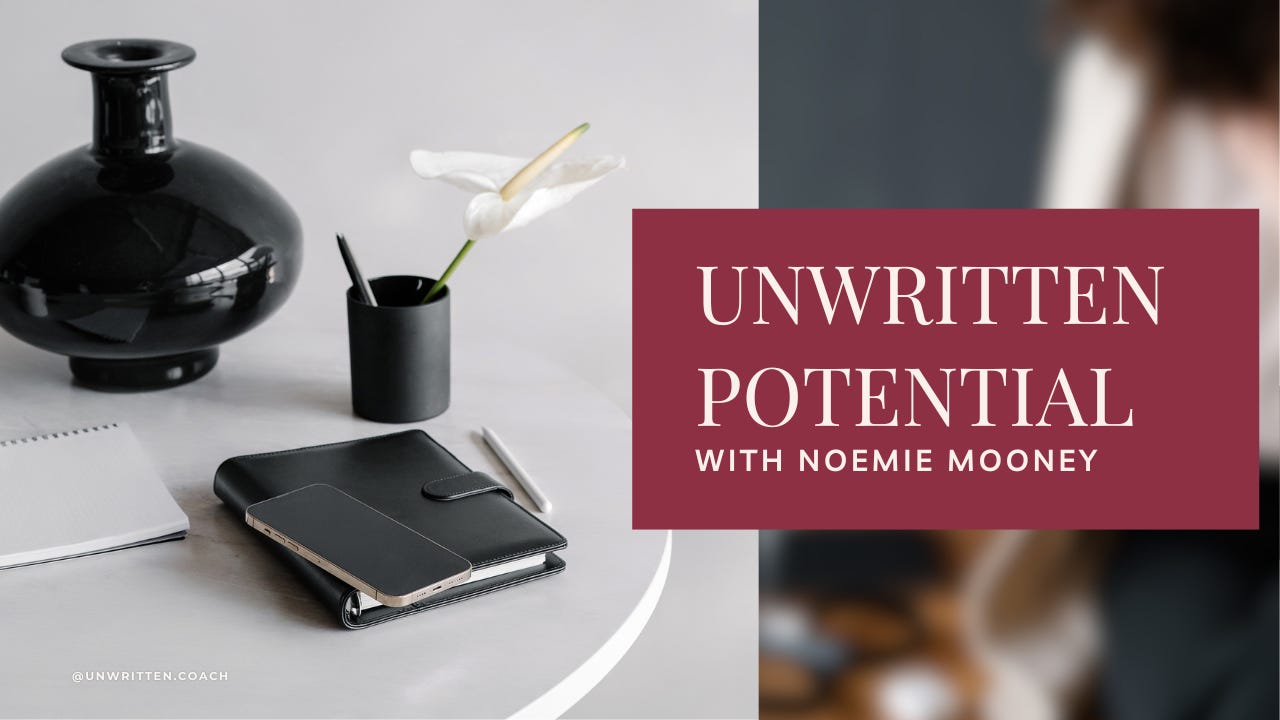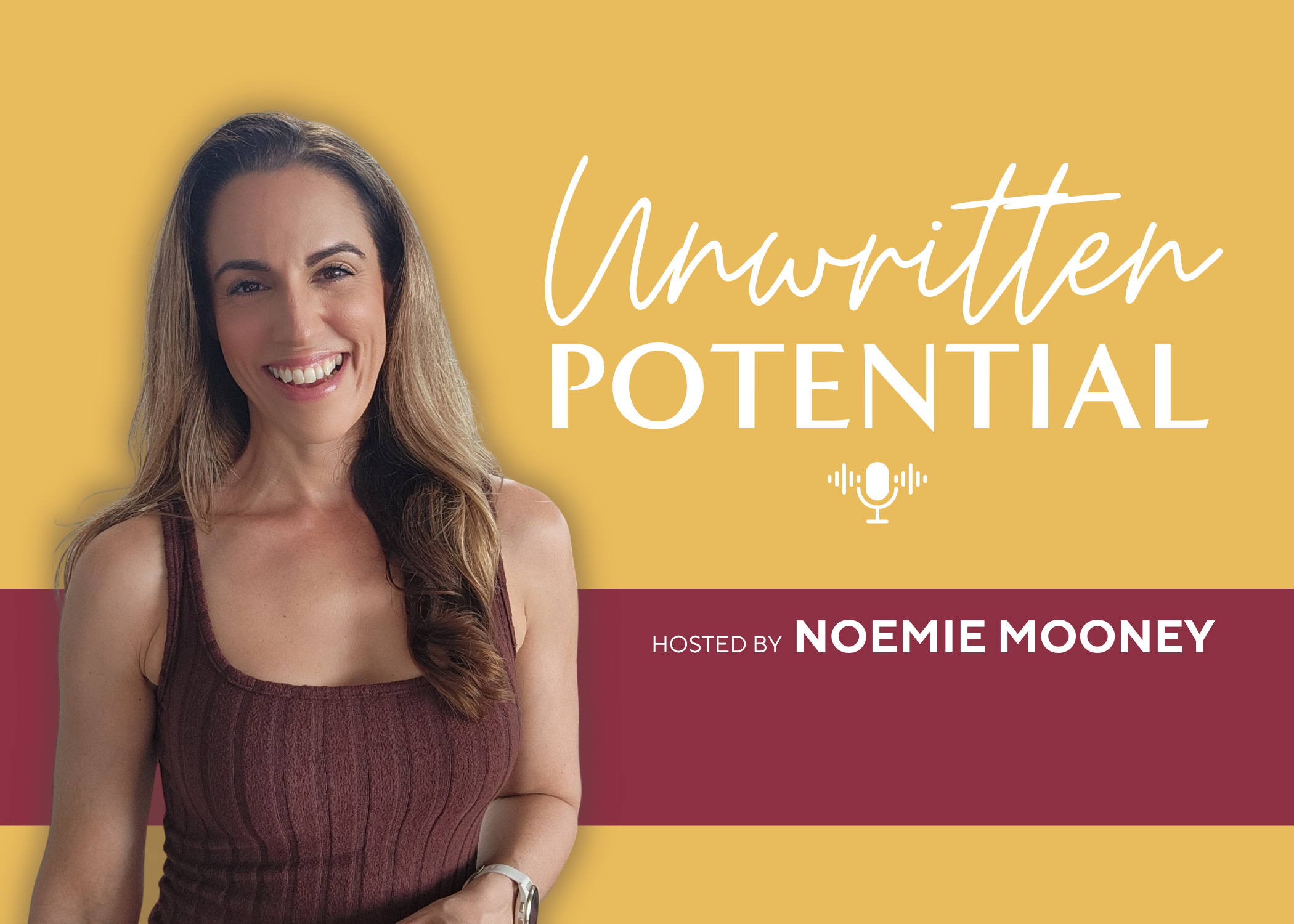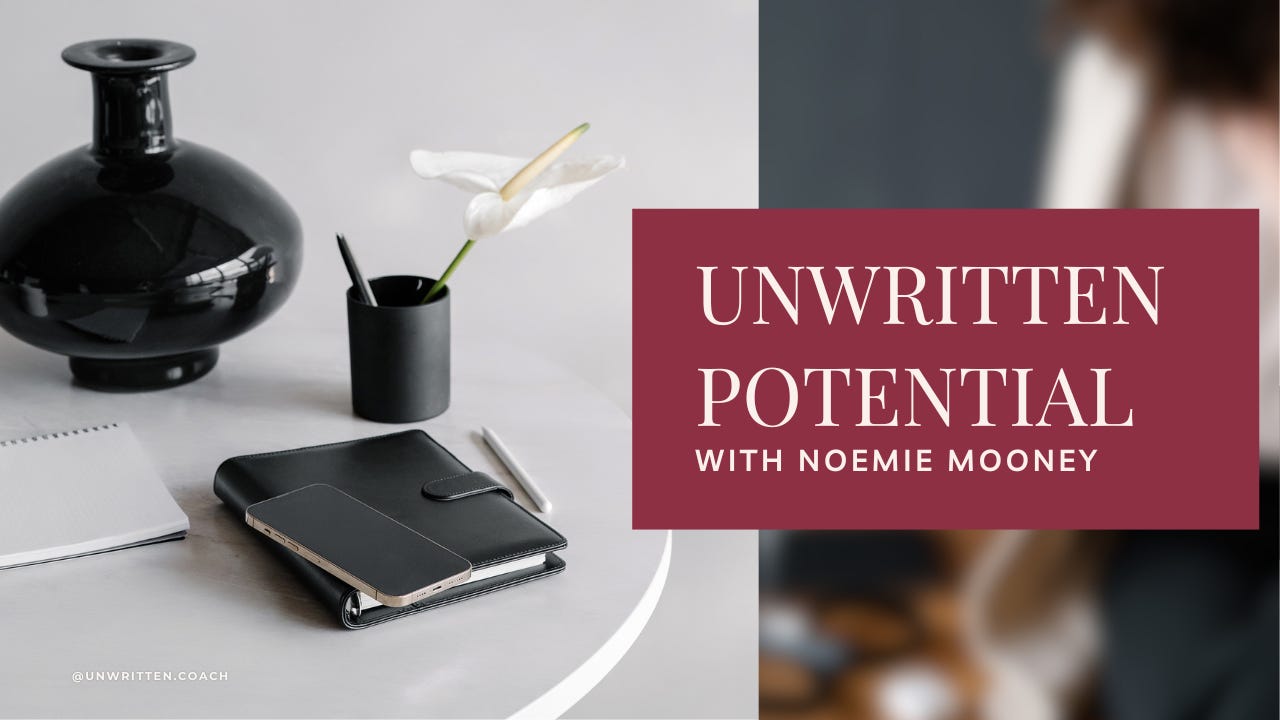Discover Unwritten Potential
Unwritten Potential

Unwritten Potential
Author: Noemie Mooney
Subscribed: 0Played: 0Subscribe
Share
© Noemie Mooney
Description
Fed up with wellness that makes life MORE stressful? Me too! Join me as I help you design a life you're obsessed with (without the guru BS, toxic wellness, or cult of hustle). Evidence-based tools that work in real, messy life. Compassion over shame. Experiments over perfection. Ready? Let's go! ⚡️
www.unwrittenpotential.com
www.unwrittenpotential.com
28 Episodes
Reverse
In this episode, I’m getting real about why December feels so much harder than it should. I break down the biology behind holiday burnout, why we keep making the same mistakes every year, and how to get through the season without completely abandoning yourself in the process. No toxic positivity, no unrealistic advice, just honest talk about navigating family stress, overspending, drinking culture, and the pressure to be “festive” when your nervous system is already depleted.Key Takeaways* December is biologically harder. Your serotonin drops with the daylight, your circadian rhythm gets scrambled, and you’re expected to do MORE right when your baseline capacity is lowest. Understanding this helps you stop blaming yourself for struggling.* You’re solving emotional problems with behavioural solutions. Overspending isn’t really about gifts; it’s about proving you’re enough. That extra drink isn’t about celebration; it’s about tolerating uncomfortable situations. The real work is noticing what you’re actually trying to avoid.* Every choice either maintains or erodes your baseline. You don’t need to be perfect or opt out of everything. You just need to pay attention to whether each decision is keeping you intact or pushing you further into deficit. The version of you that shows up in January is a direct result of how much you abandon yourself in December.What’s Next:Ready to Start 2026 Differently?Join 500+ readers getting my free, 5-min newsletter to design a life that actually feels good! This is a public episode. If you would like to discuss this with other subscribers or get access to bonus episodes, visit www.unwrittenpotential.com
This week marks six months (26 weeks straight) of publishing my podcast and my newsletter. Half a year of showing up through work, travel, illness, and mood swings. And here’s the thing: I’m not doing this because thousands of people are waiting for it or because I’m topping any charts. I’m doing it because I made a promise to myself.In this episode, I’m unpacking the mind-bend of self-imposed standards, that tension between being kind to yourself and holding yourself accountable. I’ll share what I’ve learned about why self-compassion sometimes means doing the hard thing anyway, even when no one’s watching, even when it would be easier to quit.This isn’t about hustle culture. It’s about trust, integrity, and treating yourself like someone worthy of your own commitment.Get my free, 5-min weekly newsletter. Read by 400+ people to design a life they love💡 3 Key Takeaways* Self-compassion isn’t always soft.Sometimes the most caring thing you can do for yourself is to follow through, even when it’s uncomfortable, inconvenient, or unseen.* You build self-trust through consistency.Every time you keep a promise to yourself, you reinforce the belief that you can rely on you. That’s how real confidence is built.* The magic is in the messy middle.Progress happens long before the results show. When the novelty fades and no one’s cheering you on, that’s when the real transformation begins.Join 400+ readers getting the 5-min newsletter to design a life that actually feels good This is a public episode. If you would like to discuss this with other subscribers or get access to bonus episodes, visit www.unwrittenpotential.com
Last year, I did something shocking: I stopped therapy. Not because I was magically healed, but because I’d become tired of constantly looking inward. Every moment needed analysing, every feeling required processing, and I’d forgotten how to just exist. That’s when I realised something crucial: maybe the problem isn’t that we’re not trying hard enough. Maybe we’re trying too hard.The Wellness Industry ParadoxHere’s what keeps me up at night. We’re spending 6.8 trillion dollars globally on self-improvement, yet 82% of employees are at risk of burnout. The wellness industry is booming while our actual wellbeing collapses. This isn’t coincidental. It’s what researchers call “the curse of constant self-optimisation”, and it’s destroying us from the inside out.I know this intimately. I spent 500 Singapore dollars on a fancy Garmin smartwatch after weeks of research. It tracked everything: sleep stages, stress levels, body battery, VO2 max. The constant data stressed me out so much that I ended up using it for basic step counting. Things a twenty-dollar watch could do.The trap works like this: you spot a flaw, anxiety kicks in, you find a solution, get temporary relief, then immediately scan for the next thing to fix. This isn’t growth. This is anxiety management disguised as productivity.When Hustle Culture Wears Therapy LanguageHere’s the uncomfortable truth: hustle culture didn’t die during the pandemic. It just learned to speak therapy language. Meditation apps gamify inner peace with streak counters. Morning routines become rigid optimisation protocols. Rest gets rebranded as “recovery” so we can justify it. Hobbies transform into side hustles because apparently we can’t do anything just for fun anymore.We’re literally buying programmes to teach us how to stop buying programmes. The irony would be funny if it wasn’t so depressing.Breaking Free: Healthy Growth vs Toxic OptimisationGrowth isn’t the problem. The problem is how optimisation culture has hijacked healthy practices. Toxic optimisation ties your worth to productivity, makes rest impossible without guilt, and pursues goals from shame. Healthy growth aligns goals with your actual values, combines self-compassion with self-improvement, and treats rest as necessary, not something to earn.The most radical act of self-improvement? Sometimes it’s improvement by subtraction, not addition. What would you do differently if you stopped treating yourself like a broken thing that needs fixing?3 Key Takeaways1️⃣ Learn the difference between toxic optimisation and healthy growth. Next time you set a goal, pause and ask: Is this coming from self-compassion or self-punishment? Is this aligned with my values or just what I think I “should” do? That question changes everything.2️⃣ Recognise when hustle culture is wearing therapy language. If your wellness routine requires a spreadsheet, it’s not wellness. If you feel guilty skipping one day, that’s pressure, not self-care. If you’re optimising sleep but losing sleep over the optimisation, you’ve spotted the problem.3️⃣ Try the practice of stopping. Pick one tracking app, one “should”, one wellness practice creating more stress than benefit. Stop it for a week. See what happens. You’re not abandoning growth, you’re creating space to figure out which goals are actually yours.Join the Movement!If you enjoyed this episode, you’re going to love my newsletter! I dive deeper into these topics and share exclusive tools, guides, and behind-the-scenes insights that I don’t share anywhere else. It’s like getting your own coach in your inbox every week. Subscribe to join our community to get unstuck, grow and unleash your Unwritten Potential! This is a public episode. If you would like to discuss this with other subscribers or get access to bonus episodes, visit www.unwrittenpotential.com
What scares you more: the thing you might fail at, or never trying at all? In six weeks, I’m packing a suitcase and flying one-way to Buenos Aires for a year-long Latin American adventure. Am I terrified? Absolutely. Am I doing it anyway? Abso-f*****g-lutely. Today, I’m sharing how to take action despite fear and why courage isn’t about being fearless.Three Key Takeaways1️⃣ Your fear response is often your brain being overprotective, not logical. Understanding that your amygdala can’t tell the difference between real danger and discomfort helps you question whether the fear is actually valid or just your ancient wiring being dramatic.2️⃣ Use the 1% strategy to make scary things manageable. Take whatever terrifies you and break it down into the tiniest possible version. Do that 1% thing this week, then build from there. Small steps create confidence for bigger leaps.3️⃣ The fear of regret should be bigger than the fear of the unknown. Five years from now, you won’t regret trying. You’ll only regret not trying. Ask yourself what you’d do if you weren’t afraid, then do the smallest version of that today.Join the Movement! If you enjoyed this episode, you’re going to love my newsletter! I dive deeper into these topics and share exclusive tools, guides, and behind-the-scenes insights that I don’t share anywhere else. It’s like getting your own coach in your inbox every week. Subscribe at www.unwrittenpotential.com to join our community to get unstuck, grow and unleash your Unwritten Potential! This is a public episode. If you would like to discuss this with other subscribers or get access to bonus episodes, visit www.unwrittenpotential.com
GPS vs Compass: Why Your Perfect System Is Actually Keeping You Stuck Have you ever had a perfectly planned day completely fall apart, and instead of pivoting, you just... froze? I had this happen last Tuesday, and it made me realise something huge: we're all stuck in GPS mode when what we actually need is a compass. If you've ever felt like your rigid routine or productivity system is working against you instead of for you, this episode is going to change everything. I'm breaking down why perfect systems keep us trapped and giving you five strategies to navigate your real, messy life.Why GPS Thinking Keeps You StuckHere's the thing about productivity culture: we've been sold this idea that if we just optimise everything, schedule everything, and build the perfect routine, we'll finally have our lives together. But what happens when you're exhausted? When something unexpected comes up? When life doesn't follow your perfect plan?You panic. You freeze. You feel like a complete failure.This is what I call GPS thinking. Just like GPS loses its mind when you miss a turn ("RECALCULATING! TURN AROUND!"), we treat every deviation from our plan as a disaster. We become rigid, unable to adapt, and completely paralysed when things don't go exactly as scheduled.The Compass Approach: A Better FrameworkA compass doesn't care about the specific route. It just points you towards what matters: your values, your goals, your direction. The path might twist, you might take detours, but you're still heading in the right direction.This framework is actually grounded in Acceptance and Commitment Therapy (ACT), which introduces the concept of "choice points." At any moment, you can either move towards what matters (even when it's uncomfortable) or move away from discomfort (even when it takes you from your goals).In this episode, I share five practical strategies to switch from GPS mode to compass mode: asking better questions, starting ridiculously small, noticing your patterns without judgement, supporting your biology, and accepting discomfort. These aren't about optimisation or perfection. They're about staying oriented towards what matters, even when everything feels messy.Three Key Takeaways1️⃣ GPS mode demands perfection; compass mode embraces direction. You don't need the perfect route. You just need to keep pointing towards what matters, one small step at a time.2️⃣ The most important compass move when you're depleted? Rest. Supporting your biology isn't an away move, it's a towards move. You're moving towards being someone who can actually function and do meaningful work.3️⃣ You don't need to feel motivated to take action. You can feel stuck, anxious, and exhausted AND still take one tiny compass move. These two things can coexist, and that's where real freedom lives.Resources MentionedYour Personal Compass: A Choice Point Guide - I created this free worksheet to help you identify your GPS patterns, reconnect with your values, and plan your compass moves for the week. It's practical, evidence-based, and designed for real life. Download it at go.unwritten.coach/25Full Article - Read the expanded version of this episode with additional insights and examples in my newsletter at unwrittenpotential.substack.comJoin the Movement! If you enjoyed this episode, you're going to love my newsletter! I dive deeper into these topics and share exclusive tools, guides, and behind-the-scenes insights that I don't share anywhere else. It's like getting your own coach in your inbox every week. Subscribe at https://go.unwritten.coach/newsletter to join our community to get unstuck, grow and unleash your Unwritten Potential!Episode Length: 13-14 minutes Keywords: productivity without burnout, compass thinking, sustainable productivity, acceptance and commitment therapy, rigid routines, GPS vs compass, choice pointsPerfect for: High achievers tired of hustle culture, professionals dealing with burnout, anyone struggling with rigid systems and perfectionism This is a public episode. If you would like to discuss this with other subscribers or get access to bonus episodes, visit www.unwrittenpotential.com
Important Note: If you're drinking heavily every day or experience withdrawal symptoms, please speak with a healthcare provider before making changes. This advice, based on my own personal experience, is for people questioning their relationship with alcohol, not for managing physical dependence. Have you ever woken up on a Sunday morning, head pounding, replaying the night before and asking yourself, "Am I an alcoholic?" I spent years trapped in that question, and it got me absolutely nowhere. In this episode, I'm sharing the one question that changed everything about my relationship with alcohol, and why starting your Dry January preparation NOW (not on 1 January) is the key to actually making it stick.The Question That Changes Everything When You're Questioning Your Relationship With AlcoholThree years ago, I was a LegalTech Programme Manager by day and a party girl by night. My drinking wasn't fun anymore, it was dark. I kept asking myself if I was an alcoholic, but that question only led to shame and confusion. Then I read one line in a book called "Not Drinking Tonight" that shifted my entire perspective: "Would your life be happier without alcohol?"The answer was stupidly obvious. Of course my life would be happier without alcohol. This wasn't about labels or hitting rock bottom, this was about choice. But here's what nobody tells you: I read that question in December and didn't quit drinking until March. Those three months of living with the cognitive dissonance? That's where the real transformation happened.Why Dry January Preparation Starts 77 Days Before JanuaryIf you're thinking about trying Dry January or rethinking your relationship with drinking, the absolute worst thing you can do is wait until 1 January to start the work. Real change isn't a light switch, it's a dimmer you adjust gradually.I'm sharing the exact observation strategies I used during those three months: noticing when you reach for a drink and why, identifying the gap between your actions and your values, and paying attention to your "never again" moments without judgement. This isn't about willpower, it's about self-knowledge. By the time January arrives, you won't be starting from scratch.What to Actually Expect When You Quit Drinking (The Messy Middle Nobody Mentions)The early days of an alcohol-free lifestyle won't be magical. Your brain needs time to reset its dopamine levels, so everything feels "meh" for a while. Weeks two and three are often the hardest. But then? You start noticing beauty in mundane moments, a quieter inner voice, better sleep, and sharper thinking. Some people discover sobriety feels like relief, like coming home to yourself.Three Key Takeaways1️⃣ Ask the right question: Stop asking "Am I an alcoholic?" and start asking "Would my life be happier without alcohol?" This shifts from shame to choice and opens up real change.2️⃣ Start observing now: Use the 77 days before January to watch your patterns without judgement. Notice when you drink, what triggers the urge, and the gap between your actions and values. This internal work makes change inevitable, not forced.3️⃣ Expect the messy middle: The transformation doesn't happen when you quit, it happens in the months of quiet observation beforehand. Be patient with your brain's reset period and trust that clarity comes.Resources Mentioned"Not Drinking Tonight" by Amanda E. White - The book that introduced me to the life-changing question about happiness and alcoholJoin the Movement! If you enjoyed this episode, you're going to love my newsletter! I dive deeper into these topics and share exclusive tools, guides, and behind-the-scenes insights that I don't share anywhere else. It's like getting your own coach in your inbox every week. Subscribe at https://go.unwritten.coach/newsletter to join our community to get unstuck, grow and unleash your Unwritten Potential! This is a public episode. If you would like to discuss this with other subscribers or get access to bonus episodes, visit www.unwrittenpotential.com
How to Take Action Before You're PreparedWhat if I told you that waiting to feel ready is just another way of staying stuck? In this episode, I'm sharing what happened when I stopped waiting for confidence and started making decisions anyway—including how I ended up DJing at the Singapore Grand Prix without feeling ready at all.Why Readiness Is a Decision, Not a FeelingHere's the truth I've learned: confidence doesn't come before action. It comes after. Two years ago, I started DJing as a new way to connect with people after giving up drinking. I practised in my living room, did a few small gigs, and then did something that felt a bit unhinged—I emailed the Singapore Grand Prix team and asked if I could play at their event. They said yes.Fast forward to last weekend, and I'm standing on a massive stage at the Paddock Club with thousands of people in front of me, thinking "what am I doing here?" My palms were sweating, my brain was screaming, but I hit play anyway. And here's what shifted: not confidence, but action. By the time I actually felt ready (around the middle of my first track), it didn't matter anymore because I was already doing the thing.Finding Your Growth Zone Between Comfort and DangerWe often hear about stepping out of your comfort zone, but there's a sweet spot you need to aim for: the growth zone. Your comfort zone is familiar but it's not where transformation happens. The danger zone is too far, too fast—like headlining a festival when you've never DJ'd before. But the growth zone? That's where you're stretching without being completely out of your depth.The growth zone has fear, but also excitement underneath. There's doubt, but you can imagine yourself doing it. It feels risky but not reckless. That's exactly where the Grand Prix stage sat for me—I had the skills and experience, but what I didn't have was certainty. And that's the whole point.Three Key Takeaways:1️⃣ If you don't ask, you don't get. The worst that happens is you get information—either a yes that changes everything, or a no that leaves you exactly where you were before. Not asking? That's guaranteed failure.2️⃣ Action creates clarity faster than thinking ever will. Stop planning every scenario and take the smallest possible step. Send the email, make the call, book the meeting. Reality is always clearer than the stories we tell ourselves.3️⃣ Find your growth zone and aim for it. That uncomfortable but not unsafe space between comfort and danger is where all the magic happens. Your future self is already there, waiting for you to make the decision.So what's the thing you've been waiting to feel ready for? Because you have the skills and capability right now. What you don't have is certainty—and you're never going to have that until you do it anyway.Join the Movement! If you enjoyed this episode, you're going to love my newsletter! I dive deeper into these topics and share exclusive tools, guides, and behind-the-scenes insights that I don't share anywhere else. It's like getting your own coach in your inbox every week. Subscribe at https://go.unwritten.coach/newsletter to join our community to get unstuck, grow and unleash your Unwritten Potential! This is a public episode. If you would like to discuss this with other subscribers or get access to bonus episodes, visit www.unwrittenpotential.com
If you've ever felt digitally connected but physically lonely, this episode is for you. I'm diving into why making friends as adults feels impossible and sharing three practical strategies to build real connection in 2025—no awkwardness required.The Friendship Recession Is RealHere's something we don't talk about enough: we're living through a friendship recession, and it's affecting nearly everyone. Globally, about 1 in 6 people say they feel lonely, and for many, it's a daily reality. This isn't just a personal struggle—it's a public health crisis.I spend most of my waking hours bouncing from small screen to medium screen to big screen, and when I'm not glued to a device, I'm usually too exhausted to connect in real life. Sound familiar? The truth is, the system is stacked against us when it comes to building friendships as adults.Why Adult Friendships Feel ImpossibleWe've lost our "third places"—those bars, cafés, record stores, or clubs where you could just bump into people. I still remember Dublin nightclubs in the early 2000s. You'd go out with friends, see familiar faces, and always meet new people. These weren't scheduled hangouts; connection just happened.These days, we're trapped in the work-home-errands triangle. If you work from home like me, you could easily go a full day without speaking to another human being. We live in a culture poisoned by productivity, where friendship—which requires inefficiency and just hanging out—feels like a luxury we can't afford.And let's be honest: we're terrified of looking too "thirsty." Asking someone to hang out feels as vulnerable as asking them on a date, so we wait, and nothing happens.Your Friendship Playbook for 2025In this episode, I'm sharing three simple, sneaky moves that bypass the awkwardness and help you build meaningful connections:Build Your Pockets of Community: You can't wait for a third place to appear—you have to create or find one. Take my gym, for example. After two years of showing up at 10am most mornings, nods turned into chats. Consistency does the heavy lifting. And remember, third places aren't just physical anymore. Some of my most enriching connections are in online communities like my coaching groups and even here on Substack.Master the Low-Stakes Invite: Stop saying "We should hang out sometime!" and start saying "Hey, I'm heading to that new café on Saturday at 10. Feel free to swing by if you're around." The difference? You're going anyway, so if they say no, it's not rejection—it's just logistics.Nurture Your Close Friends with Low-Pressure Love: Think of messages from friends as postcards. They arrive, they bring joy, but there's no expectation for an immediate reply. My closest friends are in France and Ireland, and we connect through bursts of voice notes, silly memes, and songs that remind us of each other.Three Key Takeaways1️⃣ Create your own third places: Find or build communities where you can show up consistently—whether it's a gym, online group, or local café. Connection happens through repeated, low-pressure encounters.2️⃣ Use the low-stakes invite template: "Hey, I'm planning to [do X activity] at [Y place/time]. Would love for you to join if you're free!" You're not asking for commitment; you're just opening a door.3️⃣ Give yourself permission for low-pressure connection: You don't need constant conversation to maintain close friendships. Simple, sporadic touchpoints remind people you're there, no matter the distance.Your Experiment This WeekPick ONE person you'd like to know better—someone from the gym, an online group, or a neighbor. Send them one low-stakes invite using this template:"Hey [Name]! I'm grabbing brunch at that new place on Main Street this Sunday around 11am. No pressure at all, but if you're free and fancy it, would love for you to swing by!"The goal isn't for them to say yes. The goal is to prove to yourself that reaching out isn't as scary as it feels.Join the Movement! If you enjoyed this episode, you're going to love my newsletter! I dive deeper into these topics and share exclusive tools, guides, and behind-the-scenes insights that I don't share anywhere else. It's like getting your own coach in your inbox every week. Subscribe at https://go.unwritten.coach/newsletter to join our community to get unstuck, grow and unleash your Unwritten Potential! This is a public episode. If you would like to discuss this with other subscribers or get access to bonus episodes, visit www.unwrittenpotential.com
Before we dive in, if you’d like a structured way to tackle your relationship with your phone? I’ve created a free 7-Day Digital Curator’s Toolkit that walks you through exactly how to reclaim 2 hours daily with practical worksheets and daily exercises. Download it at https://go.unwritten.coach/19Ever catch yourself mindlessly scrolling with zero memory of opening your phone? I dive into why digital detoxes fail and share the exact strategies to become a digital curator of your own life instead of letting algorithms control your mind.Why Digital Detoxes Don’t Work (And What Does)I’m calling BS on digital detoxes because they treat technology like the enemy when the real problem is that we’ve stopped curating our digital consumption. Here’s the truth: you’re not weak for getting hooked on your phone - you’re human fighting a rigged game designed by tech companies to keep you scrolling.The solution isn’t hiding your phone in a drawer like it’s contraband. Instead, I want you to think like a museum curator who carefully chooses what gets displayed in their gallery. That’s exactly what we’re doing with your digital life.Three Game-Changing Strategies to Curate Your MindThe “Why” Audit for Mindful Phone Use Before opening any app, pause for three seconds and ask: “Why am I here? What do I actually want from this?” This pattern interrupt literally stops your habit loop and forces your conscious brain to take control. It’s the simplest way to break phone addiction without going cold turkey.Edit Your Mental Gallery Your social media feed is decorating the inside of your mind, so be ruthless about what gets in. I challenge you to unfollow, mute, or delete 20 accounts that don’t inspire, educate, or energize you. If you wouldn’t hang it in your living room, why let it live in your head?Replace Digital Consumption with Analog Joy Here’s where the magic happens - you fill that reclaimed time with real-world activities that actually nourish you. Set up an “analog corner” with books, journals, or art supplies. This choice architecture makes the good choice the easy choice, because willpower is overrated but smart setup is everything.Three Key Takeaways1️⃣ Practice the 3-second pause before opening apps to interrupt autopilot scrolling and regain conscious control of your attention2️⃣ Curate your feeds like a museum curator - ruthlessly remove content that doesn’t inspire, educate, or energize your mind3️⃣ Create analog alternatives that bring genuine joy instead of empty scrolling calories - your future self will thank youResources Mentioned* ⚡️ Free 7-Day Digital Curator’s Toolkit: Complete worksheets and daily exercises to reclaim 2 hours daily - Download it at https://go.unwritten.coach/19* ☺️ 5-4-3-2-1 Grounding Technique: Find 5 things you see, 4 you touch, 3 you hear, 2 you smell, 1 you taste during outdoor breaksJoin the Movement! If you enjoyed this episode, you’re going to love my newsletter! I dive deeper into these topics and share exclusive tools, guides, and behind-the-scenes insights that I don’t share anywhere else. It’s like getting your own coach in your inbox every week. Subscribe at https://go.unwritten.coach/newsletter to join our community to get unstuck, grow and unleash your Unwritten Potential! This is a public episode. If you would like to discuss this with other subscribers or get access to bonus episodes, visit www.unwrittenpotential.com
📖 If you prefer to read the essay, click here.Have you ever found yourself in a conversation with a friend or family member that felt completely disconnected from reality? This will I share a personal rule, "don't argue with stupid", and explore what happens when that rule is challenged by someone you care about falling down a conspiracy theory rabbit hole.This episode dives deep into the psychology of why people believe things that aren't based in fact. It’s not about intelligence, it’s about three core human needs: * The need for understanding* The need for control* The need for belongingWhen you try to fight these beliefs with data, you're not just challenging an idea, you're challenging someone's psychological safety net. Learn why this approach backfires and discover a powerful new goal for these interactions: connection, not correction. You'll walk away with a practical toolkit to protect your relationships and your own peace of mind.Key Takeaways:* It’s Not About Facts: Trying to win an argument with data and evidence often fails because you’re not addressing the real, underlying emotional needs that a conspiracy theory or fringe belief is fulfilling for that person.* The Three Core Needs: Disinformation often takes hold by satisfying three powerful human needs:* Understanding: It provides simple, clear answers to complex and frightening world events.* Control: It offers a sense of agency and "secret knowledge" in a world that feels chaotic.* Belonging: It creates an instant community and a powerful sense of tribal connection.* Change the Goal: The objective is not to win the argument. A single conversation won't change a deeply held belief. The new goal should be:* With friends and family: Focus on connection.* In a professional setting: Focus on getting the job done.A Toolkit for Difficult Conversations:* Master the Graceful Dodge: You are not obligated to engage. Acknowledge what they said and pivot to a shared memory or back to the task at hand.* Choose Curiosity Over Confrontation: Instead of attacking their point, ask questions to understand the feeling behind it (e.g., "It sounds like you’re really concerned about safety. Tell me more."). This de-escalates tension.* Be a Human with Boundaries: Politely and firmly state that you won't discuss certain topics to protect your relationship. This is a public episode. If you would like to discuss this with other subscribers or get access to bonus episodes, visit www.unwrittenpotential.com
In today's episode, we're unpacking why your good intentions often keep failing: your brain tends to resist positive changes.The Real Reason Your Habits Often Keep FailingResearch suggests your brain isn't being lazy, it's actually doing what it evolved to do. When you try to change your behaviour, your brain's systems can treat new habits like potential disruptions to established patterns. This might explain why by day four of quitting smoking, I'd find myself at 7-11 buying cigarettes again, wondering what happened to all my Sunday night determination.Studies indicate that around 45% of our daily behaviours tend to happen in similar locations each day. Your brain has carved neural pathways for these established patterns, while your new gym intention is like a newer pathway trying to compete with a well-traveled road. This could be why willpower often feels challenging - you may be working against deeply ingrained patterns.Working WITH Your Biology Instead of Against ItThe game-changer for me came when I stopped trying to overpower my brain and started working with these natural tendencies. I discovered four key strategies that seemed to work with my neural wiring rather than against it.First is environment design - making the right choice the easier choice. When I quit smoking, I didn't just throw away cigarettes; I removed lighters, ashtrays, even the chair I used to smoke in. Second is habit stacking - I attached my Spanish learning to my daily shower because my brain was already programmed for that routine.The minimum viable dose approach means starting surprisingly small. My fitness journey began with just 10 minutes on the arc trainer twice a week. Now I work out more intensely five times a week, but it started with consistency over intensity, which seems to align with how neural pathways can develop over time.Three Key Takeaways1️⃣ Your brain's resistance might not be weakness - it could be natural wiring. When you understand that challenging habit changes aren't necessarily about lacking willpower, you can focus on working with your patterns instead of fighting them.2️⃣ Consider starting small and stacking on existing habits. Try attaching your new behavior to something you already do automatically - this can potentially work with your existing routines instead of trying to build entirely new ones.3️⃣ Research suggests neural rewiring can take time, but every action may matter. Dr. Phillippa Lally's research indicates habit formation averages around 66 days. Each repetition might be strengthening new pathways, even when progress doesn't feel obvious.Join the Movement! If you enjoyed this episode, you're going to love my newsletter! I dive deeper into these topics and share exclusive tools, guides, and behind-the-scenes insights that I don't share anywhere else. It's like getting your own coach in your inbox every week. Subscribe at https://go.unwritten.coach/newsletter to join our community to get unstuck, grow and unleash your Unwritten Potential!*Disclaimer: This content is for educational purposes. Please consult with healthcare professionals for personalised advice. This is a public episode. If you would like to discuss this with other subscribers or get access to bonus episodes, visit www.unwrittenpotential.com
Ever caught yourself thinking that your inner critic is actually helping you? I used to believe that too. But here’s the truth: that voice isn’t a coach, it’s a troll, and shame has never been an effective long-term motivator. In this episode, I share the science behind why shame doesn’t work, how it messes with your brain, and the practical strategies you can use to coach yourself with compassion instead.Why Shame Never MotivatesI don’t get angry often, but watching the Netflix documentary Fit for TV: The Reality of The Biggest Loser left me both furious and heartbroken. It revealed the brutal humiliation contestants endured: eight-hour workouts, dehydration, collapse, all packaged as entertainment. And worse? Many of us absorbed the message that humiliation equals transformation.The reality is that shame doesn’t create change, it creates anxiety and self-defeat. Neuroscience shows that self-criticism activates your brain’s threat system and impairs clear thinking. On the flip side, self-compassion lights up the caregiving system, releases oxytocin, and keeps your problem-solving brain online. Decades of research from Carol Dweck’s growth mindset to BJ Fogg’s habit science prove that compassion fuels resilience, while shame shuts it down.Three Strategies to Coach Yourself with CompassionSo how do we ditch the troll and step into a kinder, more effective way of motivating ourselves? Here are three simple but powerful strategies I use with my clients and in my own life:1. Call Out the TrollThat voice in your head speaks in absolutes: always, never, you’re a failure. Name it for what it is, a heckler not a coach. Try the best-friend test: would you ever say those words to your closest friend? If not, you know they don’t belong in your own head.2. Reality Check with Self-CompassionKristin Neff’s research gives us a three-step tool: notice your suffering, remember you’re human, and offer yourself kindness. Then add an evidence check: what growth would your past self be proud of? Often your body already knows what you need, whether it is rest, water, fresh air, or connection.3. Practice Good EnoughPerfectionism isn’t about standards, it’s about fear. Start embracing “good enough.” Send the email that is 90% there. Do the workout that fits your energy today. Progress, not perfection, creates momentum and builds the life you actually want.Three Key Takeaways1️⃣ Shame doesn’t motivate, it paralyses your brain and keeps you stuck.2️⃣ Self-compassion activates your brain’s growth system and fuels clarity, resilience, and real change.3️⃣ You can fire your inner troll and coach yourself with kindness, starting today.Join the Movement!If you enjoyed this episode, you're going to love my newsletter! I dive deeper into these topics and share exclusive tools, guides, and behind-the-scenes insights that I don't share anywhere else. It's like getting your own coach in your inbox every week. Subscribe at https://go.unwritten.coach/newsletter to join our community to get unstuck, grow and unleash your Unwritten Potential! This is a public episode. If you would like to discuss this with other subscribers or get access to bonus episodes, visit www.unwrittenpotential.com
🍂 Join the September challenge! ➡️ https://go.unwritten.coach/15September has a secret most people overlook. It is actually the best time to transform your life. Forget January resolutions that fizzle out by February. This is when your brain and body are wired for change. In this episode, I’ll explain the science behind September energy and share the exact 90-day blueprint you can use to finish the year strong.Why September Energy Hits DifferentResearchers call it the fresh start effect. It explains why new seasons, birthdays, and even Mondays make us crave change. But September is the ultimate reset. The light shifts. Your circadian rhythms adjust. There is collective momentum everywhere you look.Unlike January, when everything in nature is dormant and energy is low, September is alive with transition and growth. Animals are preparing. Trees are transforming. Your brain is picking up on the same cues. That urge to “get your life together” isn’t weakness. It is your body saying now is the time. Three Key Takeaways1️⃣ September is biologically and psychologically the best time to start fresh, thanks to the fresh start effect.2️⃣ You don’t need to overhaul everything. 90-day sprints create powerful, sustainable change.3️⃣ Transformation does not wait for January. Start small today and build evidence that you are becoming who you want to be. Join the Movement!If you enjoyed this episode, you’re going to love my newsletter! I dive deeper into these topics and share exclusive tools, guides, and behind-the-scenes insights that I don’t share anywhere else. It’s like getting your own coach in your inbox every week. Subscribe at https://go.unwritten.coach/newsletter to join our community to get unstuck, grow and unleash your Unwritten Potential! This is a public episode. If you would like to discuss this with other subscribers or get access to bonus episodes, visit www.unwrittenpotential.com
AI Anxiety Is Real. Here's How to Beat It.The first time I asked an AI to write something for me, I felt two things: complete awe and sheer panic. Sound familiar? In this episode, I'm getting to the heart of what's really driving AI anxiety and sharing my personal strategies for moving from fear to empowerment. Why AI Anxiety Feels So PersonalI see it everywhere: the headlines, the doom-and-gloom conversations, the feeling that our skills might not matter in five years. But here’s the thing: most of the noise out there misses the point. The data shows that AI anxiety isn't really about the technology. It’s about identity threat. It’s the feeling that if a machine can do the thing you’ve always done, what’s left that is uniquely you? I’m here to tell you that this feeling is a normal, human response to a new kind of uncertainty, and it’s completely okay to feel it.We get so caught up in the panic that we miss the bigger picture. The reality is, most of the dire predictions you hear are coming from people who have a vested interest in hyping up their technology. While some jobs will be affected, research from MIT shows that for now, AI in the workplace is primarily replacing outsourced tasks, not internal staff. This gives you time to adapt and position yourself for the future. Your Anti-Replacement StrategyInstead of competing with machines on speed and efficiency, the real strategy is to double down on what makes you gloriously, imperfectly human. The future doesn't belong to people who can write the best prompts. It belongs to people who can think like humans and aren’t afraid to show it. It’s about using AI as your smartest, greenest intern, and then doing the real, high-impact work that only you can do.In this episode, I break down what an anti-replacement strategy looks like in the real world. I’m not talking about some vague, corporate fluff. I’m talking about specific, actionable steps you can take starting today. Three Key Takeaways1️⃣ AI anxiety is a normal human response to a perceived identity threat. It's not about the technology; it's about what it means for your sense of self-worth and purpose.2️⃣ The biggest mistake is to either ignore AI or panic about it. Instead, reframe the question from "What will AI take from me?" to "What will AI free me to do?"3️⃣ Your most valuable skills are the things that are "un-systematisable". Double down on what makes you human: caring about outcomes, navigating what’s unsaid, and learning from messy experience. Resources MentionedThe "From AI Anxiety to AI Advantage" Workbook: A free resource I created with 21 coaching questions and a 30-day action plan template to help you identify your unique value and take the next step.DOWNLOAD AT: https://go.unwritten.coach/AI Next StepIf you enjoyed this episode, you're going to love my newsletter! I dive deeper into these topics and share exclusive tools, guides, and behind-the-scenes insights that I don't share anywhere else.It's like getting your own coach in your inbox every week.⚡️ Sign up at https://go.unwritten.coach/newsletter to join our community to get unstuck, grow and unleash your Unwritten Potential! This is a public episode. If you would like to discuss this with other subscribers or get access to bonus episodes, visit www.unwrittenpotential.com
Last week I snorted oat milk latte out of my nose from laughing so hard at brunch with my girlfriend. It was the first proper belly laugh I'd had in weeks, and it hit me like a reset button for my entire nervous system. If you're a high-achieving professional who's forgotten how to prioritise joy without guilt, this episode will show you how to design more aliveness into your daily routine using science-backed strategies.Why Joy Isn't Frivolous. It's Brain FuelHere's what blew my mind when I dove into the research: joy isn't just a nice-to-have emotion. Barbara Fredrickson's Broaden-and-Build Theory shows that positive emotions literally expand your cognitive abilities. When you experience joy, your prefrontal cortex gets more resources, your visual field widens, and you can see more solutions and possibilities.This is completely different from stress, which narrows your brain into tunnel vision mode. So when we dismiss joy as frivolous or tell ourselves we haven't "earned" it yet, we're actually depriving ourselves of the emotional fuel that makes us better at everything else we're trying to accomplish.I get it though. With everything happening in the world right now, choosing joy can feel guilty. But running yourself into the ground doesn't help anyone. When you're depleted and joyless, you have less energy for your work, relationships, and community.Three Science-Based Strategies to Design Joy Into Your DayStrategy #1: Notice Your Environmental Joy CuesDesigner Ingrid Fetell Lee's research shows that joy is a predictable physical response to certain environmental stimuli: bursts of color, nature, playful shapes, interesting textures. You can literally hack this by building your personal joy cues into your environment. Wear that colorful sweater, add fresh flowers to your workspace, or take the scenic route home instead of the fastest one.Strategy #2: Schedule Micro-Moments of Joy DailyStop leaving joy up to chance and start scheduling it like any other important appointment. I'm talking about 2-5 minute micro-moments that make you feel more like yourself. Maybe it's a three-minute dance break between Zoom calls, sending a friend a ridiculous voice note, or having one "rescue song" that never fails to shift your energy.Strategy #3: Reframe Joy as ProductiveThis is the mindset shift that changes everything for high-achievers. When you feel stuck or depleted, instead of pushing harder, ask yourself: "What would feel fun right now?" Positive emotions boost creativity, problem-solving, and resilience. Joy isn't the opposite of productivity, it's what makes productivity sustainable.Three Key Takeaways1️⃣ Joy expands your cognitive abilities: Positive emotions literally give your brain more resources for creativity and problem-solving, making joy a strategic choice, not a selfish one.2️⃣ Design joy into your environment: You don't have to wait for happiness to happen accidentally. Build your personal joy cues (color, nature, music) into your daily routine for predictable nervous system resets.3️⃣ Micro-moments compound over time: Two to five minutes of intentional joy daily creates significant improvements in wellbeing, energy, and resilience. Small moments, big impact.Resources MentionedBarbara Fredrickson's Broaden-and-Build Theory - Foundational research on how positive emotions expand cognitive capacity"Joyful" by Ingrid Fetell Lee - Explores how environmental design triggers predictable joy responsesBJ Fogg's habit research - Shows how positive emotions are one of the most powerful habit-forming toolsIf you enjoyed this episode, you're going to love my newsletter! I dive deeper into these topics and share exclusive tools, guides, and behind-the-scenes insights that I don't share anywhere else. It's like getting your own coach in your inbox every week. Subscribe below to join our community to get unstuck, grow and unleash your Unwritten Potential!➡️ www.unwritten.coach This is a public episode. If you would like to discuss this with other subscribers or get access to bonus episodes, visit www.unwrittenpotential.com
Last year, I got a screen time notification that literally made me gasp: 18 hours on Instagram in one week while I was trying to build my business. If you're feeling scattered, unfocused, and frustrated with yourself, you're not broken, your brain is being systematically robbed, and I'm going to show you exactly how to take back control of your attention.The Science Behind Why You Can't FocusHere's what blew my mind: research shows we switch tasks every 47 seconds. That's less time than it takes to boil water! We're making 500 context switches per day and wondering why we feel mentally exhausted by 3 PM.Every time you switch from email to Instagram to that work document, your brain has to "change gears" - what scientists call task switching. This costs you mental fuel, and when that fuel runs out, you lose your ability to think clearly, make good decisions, and stay present with the people you love.But here's the game-changer: most distraction isn't happening TO you. According to researcher Nir Eyal, distraction is actually a choice we make to avoid discomfort. You check Instagram not because it pinged, but because you're avoiding that difficult work task. You scroll news not because you need information, but because you're avoiding sitting with your own thoughts.5 Proven Strategies to Reclaim Your FocusI'm giving you five specific strategies that actually work to protect your attention and design your environment for deep focus instead of constant distraction.First, do a brutal attention audit for one week. Track where your focus actually goes using screen time reports and random phone timers. When it goes off, ask yourself: was this moving me toward my goals or pulling me away?Second, turn off 90% of your notifications immediately. I haven't had email pings or breaking news alerts for years. Remember, each notification doesn't just steal the moment - it takes 23 minutes for your brain to fully refocus afterward.The remaining three strategies focus on smart app limits, creating device-free zones in your home, and scheduling 15 minutes of "scatter-focus" time daily. Your brain needs downtime to make connections - the best ideas don't come when you're busy, they come when you're bored.Three Key Takeaways1️⃣ Track your attention like money - Do a one-week audit to see where your focus actually goes, then protect it like your most valuable resource (because it is).2️⃣ Environment beats willpower every time - Turn off notifications, create device-free zones, and design focus rituals that signal to your brain "this matters."3️⃣ Your distraction is a choice, which means your focus can be too - You're not weak for getting distracted; you're human going up against billion-dollar algorithms designed to capture your attention.Resources Mentioned• Gloria Mark's research - Studies on task-switching and the 47-second attention span that's reshaping how we think about focus• Nir Eyal's framework - The distinction between traction (toward goals) and distraction (away from goals)• Chris Bailey's "Hyperfocus" - Research on scatter-focus time and why your brain needs intentional boredom to generate breakthrough insights ⚡️ If you enjoyed this episode, you're going to love my newsletter! I dive deeper into these topics and share exclusive tools, guides, and behind-the-scenes insights that I don't share anywhere else. It's like getting your own coach in your inbox every week. Join our small but mighty community to get unstuck, grow and unleash your Unwritten Potential! Sign-up at www.unwritten.coach This is a public episode. If you would like to discuss this with other subscribers or get access to bonus episodes, visit www.unwrittenpotential.com
The Subtraction Method: Stop These 3 Things to Design a Life You Actually Love Most wellbeing advice tells you to add more. More habits. More routines. More structure.But what if the real breakthrough comes from what you stop doing?In this episode of Unwritten Potential, we explore the science of subtraction. I’m sharing three simple, research-backed behaviours to stop if you want more clarity, energy, and momentum in your life. No guilt. No grind. Just smart, science-based change that actually sticks.This episode is part pep talk, part practical guide. You’ll walk away with powerful mindset shifts and simple tools to make change feel lighter, not harder. What You’ll LearnWhy adding more isn’t always the answerThe psychology behind why we feel stuckHow cognitive dissonance drains your energyThe power of tiny experiments for finding clarityWhy guilt and shame don’t create lasting changeWhat to say to yourself when the inner critic shows upHow to build self-respect into your habits Visit www.unwritten.coach for more resources.Listen on your favourite app: Spotify, Apple Podcasts, YouTube, Amazon Music This is a public episode. If you would like to discuss this with other subscribers or get access to bonus episodes, visit www.unwrittenpotential.com
🎁 Free Resource:Grab the Overthinker's Toolkit, a printable guide with all 7 tools to keep on hand when your brain won’t shut up: 👉 https://stan.store/NoemieMooney Episode SummaryWhat keeps you up at night?In this episode, I’m getting personal, and practical, about something that robs us of peace, confidence, and sleep: overthinking. If your brain feels like it’s stuck on a loop, this one's for you. I break down why we overthink, how it hijacks our logic, and walk you through 7 simple, science-backed tools to break the spiral and reclaim your peace.You don’t need to use them all. Just start with one and feel the shift.What You’ll Learn:Why overthinking isn’t your fault, and how it startsHow caveman brain logic shows up in modern lifeThe sneaky link between anxiety, perfectionism, and overthinking7 tools to shift from spiraling to grounded (yes, they’re easy) The 7 Tools to Break the Overthinking Loop:Name It to Tame It – Label your thoughts, shrink the panic.Shrink the Decision – Zoom into the tiniest next step.Schedule Your Worry – Create a designated space for spirals.What If, Then What? – Play the fear out ‘til it loses its power.Move Your Body – Reset your nervous system, fast.Change the Soundtrack – Rewire negative thought patterns.Come Back to Your Senses – Ground yourself in the now. Reflective Prompts:What soundtrack have you been playing on repeat?What’s one small action that could quiet your mind?What would it feel like to pause instead of push? 💌 Want to share your thoughts or feedback?Email me: noemie@unwritten.coach I’d love to hear from you! This is a public episode. If you would like to discuss this with other subscribers or get access to bonus episodes, visit www.unwrittenpotential.com
⚡️ Join my newsletter! Every week, I help 100+ burnt-out high achievers ditch unwanted habits and design a life they're obsessed with. Actionable, easy, BS-free, and science-based. Let's gooooo! Your weekly badass habit & wellbeing upgrade: science, fun, zero BS - delivered every Thursday: https://noemiemooney.kit.com/ Toxic Wellness: Unfollow, Unsubscribe, Unbothered Discover how the $4.4 trillion wellness industry sells insecurity, exploits our need for self-care, and markets toxic health ideals. Learn how to see through wellness marketing hype and reclaim your own definition of wellbeing.Description: Is the wellness industry really making us healthier, or just making us feel like we’re never enough?In this episode, we take a critical look at toxic wellness culture and how it turns health, self-care, and wellbeing into moral performance. From overpriced pseudoscience to influencer marketing, we’ll explore how this industry profits from our insecurities while pretending to empower us.You’ll learn why the wellness industry specifically targets women (and increasingly men), what toxic striving really is, and how to spot red flags in wellness marketing. I’ll also share simple, practical questions to help you think critically about wellness claims and make choices that truly support your health.Because real wellness shouldn’t enslave you. It should serve you. What We’ll Cover: ✅ The $4.4 trillion wellness industry's tactics and promises ✅ “Toxic striving” and perfectionism in self-care ✅ Gendered wellness marketing: why women are the prime targets ✅ Men’s wellness pressures and the manosphere’s influence ✅ The pseudoscience epidemic: detox teas, “natural” claims, influencer hype ✅ Red flags to spot in wellness marketing ✅ Practical critical-thinking questions to evaluate wellness claims ✅ How to reclaim your own definition of health and wellbeing 🧠 Featured Quotes & References:📖 The Gospel of Wellness – Rina Raphael“Wellness is the latest status symbol for the anxious, striving woman.”📖 The Wellness Syndrome – Carl Cederström & André Spicer“The pursuit of wellness demands not only a healthy body but also a productive, positive mind.”📖 Paula Freedman on toxic striving“An obsessive blend of workaholism, diet culture, beauty standards, and people-pleasing masquerading as self-improvement.”📖 Mind the Science – Jonathan SteaPractical questions to spot pseudoscience and hype. ✨ Key Takeaway: Real wellness isn’t about perfection or hustle. It’s about feeling good in your own skin, rejecting unrealistic standards, and defining health on your own terms. 👉 Loved this episode?Hey! I'm Noemie, former Queen of Bad Habits and corporate go-getter turned Certified Health Coach and podcaster. Every week, I help 100+ burnt-out high achievers ditch unwanted habits and design a life they're obsessed with. Actionable, easy, BS-free, and science-based. Let's gooooo! ➡️ Your weekly badass habit & wellbeing upgrade: science, fun, zero BS - delivered every Thursday: https://noemiemooney.kit.com/🔗 Further Reading / Resources:The Gospel of Wellness by Rina RaphaelThe Wellness Syndrome by Carl Cederström & André SpicerJonathan Stea’s Mind the Science Substack & articlesPaula Freedman’s resources on toxic striving This is a public episode. If you would like to discuss this with other subscribers or get access to bonus episodes, visit www.unwrittenpotential.com
Summer is here – messy, glorious, and the perfect time to check in with yourself.This week, I’m mixing it up. This isn’t just an episode to listen to – it’s a mini coaching session you’ll do with me.We’re at the halfway point of 2025. Maybe your routines are all over the place, you’re travelling more, staying up late, or just feeling that mid-year fatigue. And maybe those shiny January goals? A bit dusty by now.But here’s the good news: you have six whole months left to make this year feel right for you.In this episode, we’ll: ✅ Do an honest, no-BS mid-year check-in ✅ Clarify the 3 words that will be your North Star for the summer ✅ Choose one tiny thing to focus on – because this isn’t January, it’s “try one small thing” season ✅ Write yourself a permission slip to let go of guilt and choose what really mattersIt’s reflective, practical, and built for real life. No toxic productivity here – just honest self-coaching in your own time.💡 Listen wherever you are: on a walk, curled up with a drink, or just taking 12 minutes for you. This is a public episode. If you would like to discuss this with other subscribers or get access to bonus episodes, visit www.unwrittenpotential.com


